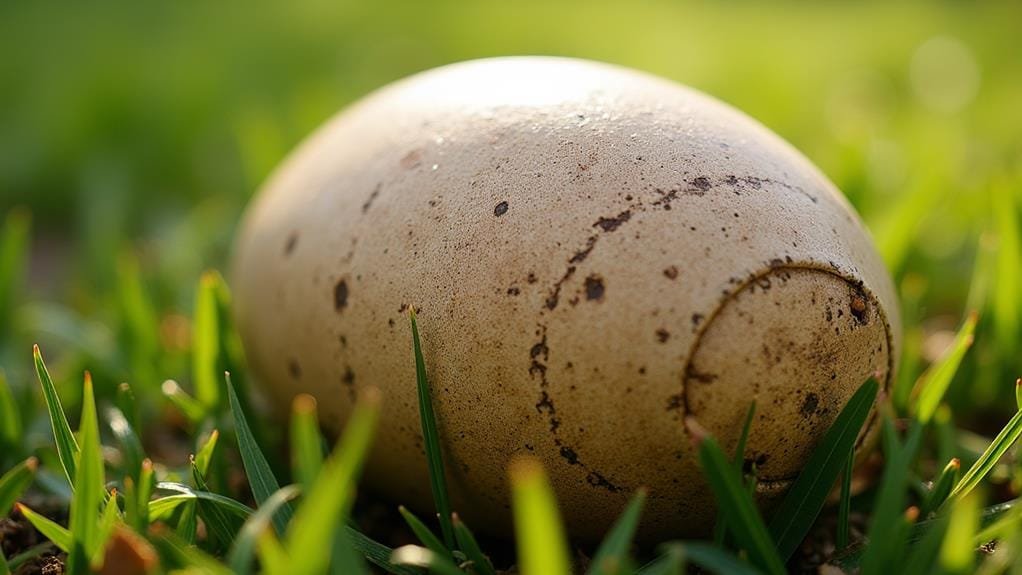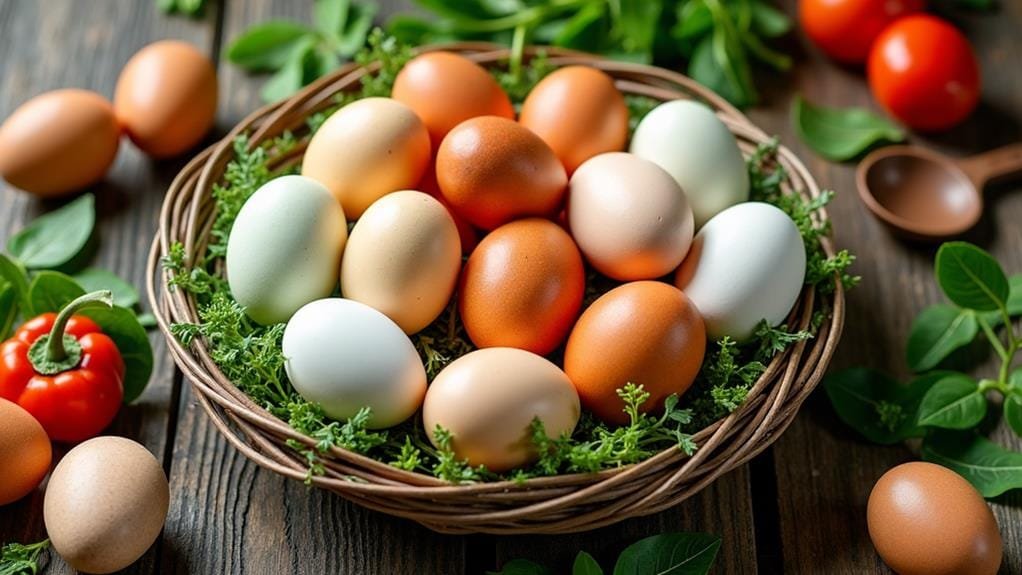No products in the cart.

Egg-cellent Choices: Exploring the Various Types of Eggs and Their Uses
Eggs are an incredibly versatile ingredient, with a variety of types to suit your culinary needs. You’ve got the classic chicken egg, great for everything from omelets to baking. Then there are duck eggs, richer and packed with protein, perfect for sauces. If you’re looking for something unique, quail eggs add a delightful twist to any platter. And let’s not forget the giant ostrich egg—one can feed a whole party! Whether you opt for organic or conventional, each type brings its benefits. Curious about how to cook them perfectly? Stick around, and you’ll discover some fantastic techniques!
Key Takeaways
- Chicken eggs are versatile and widely used in various dishes, providing essential nutrients and protein.
- Duck eggs offer a richer taste and higher nutritional density, perfect for baking and sauces.
- Quail eggs are bite-sized delicacies that add unique flavor and charm to gourmet dishes.
- Goose eggs are large, nutrient-rich, and ideal for hearty recipes, enhancing flavors in baked goods.
- Ostrich eggs, equivalent to 24 chicken eggs, present unique culinary possibilities and serve large gatherings.
Chicken Eggs: The Classic Choice

When it comes to eggs, chicken eggs are often the go-to option for many households. They’re versatile, widely available, and pack a nutritional punch. With various egg varieties like white and brown, you might wonder if there’s a difference beyond color. Spoiler alert: it’s mostly a matter of breed, not nutrition.
So, whether you’re whipping up a fluffy omelet or baking a decadent cake, chicken eggs will serve you well.
Egg production plays a vital role in making chicken eggs so accessible. Farmers raise hens specifically for their egg-laying prowess, ensuring you can find these culinary gems year-round. Did you know that a single hen can produce around 250 to 300 eggs annually? That’s a whole lot of breakfast!
As you explore the world of chicken eggs, consider their myriad uses. From simple scrambled eggs to the foundational ingredient in custards, these eggs are a kitchen staple.
They’re not just food; they’re a canvas for creativity! So, next time you crack an egg, think about the journey it took to get to your plate. Isn’t that egg-citing?
Duck Eggs: Rich and Creamy
When you think about eggs, have you ever considered duck eggs?
These little gems aren’t just rich and creamy; they also come packed with nutritional benefits that can elevate your meals.
Let’s explore how to use them in your cooking, keep them fresh, and enjoy their unique flavor.
Nutritional Benefits Overview
Duck eggs offer a rich and creamy alternative to chicken eggs, boasting a unique nutritional profile that makes them a favorite among food enthusiasts.
If you’re looking to elevate your protein intake, duck eggs deliver a whopping 9 grams of egg protein per egg, making them an excellent choice for building muscle and sustaining energy levels.
Plus, they’re packed with essential egg vitamins like B12, which supports your nervous system and promotes red blood cell formation.
Here are three key nutritional benefits of duck eggs you shouldn’t overlook:
- Higher Fat Content: Duck eggs contain more healthy fats, providing a richer taste and longer-lasting satiety.
- Enhanced Nutritional Density: With more vitamins and minerals per egg, they can help meet your dietary needs more efficiently.
- Better Omega-3 Fatty Acids: Duck eggs often have higher omega-3 levels, promoting heart health and cognitive function.
Culinary Uses and Techniques
With their rich flavor and creamy texture, duck eggs can elevate a variety of dishes in your kitchen. You’ll find that their unique qualities make them perfect for mastering culinary techniques, especially when it comes to poaching. Imagine perfectly poached duck eggs on a bed of sautéed greens—your breakfast just got a gourmet upgrade!
If you’re experimenting with egg substitutions, duck eggs stand out beautifully. Here’s a handy table to help you visualize their culinary versatility:
| Dish Type | Duck Egg Use | Benefits |
|---|---|---|
| Baking | Cakes and pastries | Adds moisture and richness |
| Breakfast | Poached or fried | Creamy texture and flavor |
| Sauces | Hollandaise | Enhanced emulsification |
| Pasta | Fresh pasta | Richer taste and smoothness |
| Custards & Puddings | Flans and crème brûlée | Creamy consistency and depth |
Storage and Freshness Tips
How can you guarantee your duck eggs stay fresh and flavorful? Proper egg storage is key! Duck eggs are richer and creamier than chicken eggs, making them a delightful choice for your culinary adventures. Here are three essential tips to keep them at their best:
- Refrigerate promptly: After purchasing or collecting duck eggs, refrigerate them immediately. Keeping them at a consistent temperature helps maintain freshness and prevents spoilage.
- Check freshness indicators: Before using your duck eggs, perform a simple float test. If the egg sinks and lays flat on the bottom, it’s fresh. If it stands upright or floats, it’s best to toss it.
- Store in the carton: Keep your duck eggs in their original carton to protect them from absorbing odors and flavors from other foods in your fridge. This also helps maintain the ideal humidity level.
Quail Eggs: Bite-Sized Delights

Quail eggs are tiny treasures in the culinary world, prized for their delicate flavor and unique appearance. Have you ever tried one? These little gems pack a punch, making them perfect for gourmet uses. Their rich, buttery taste elevates ordinary dishes into extraordinary ones. Imagine a perfectly poached quail egg resting atop a creamy risotto or nestled in a vibrant salad. It’s a game-changer!
One of the best things about a quail egg is its versatility. You can whip them up in various ways—boiled, fried, or even pickled. Each method brings out different nuances in flavor, allowing you to experiment and impress your friends.
Plus, their petite size makes them a charming addition to any appetizer platter.
Have you considered using quail eggs in your next culinary adventure? Not only do they add flair, but they also serve as a conversation starter. As you explore their gourmet uses, you’ll discover how a simple quail egg can transform your dishes.
Goose Eggs: Large and Flavorful
If you’re intrigued by unique eggs, you’ll want to explore the world of goose eggs. These large, flavorful eggs are a culinary delight that can elevate your cooking game.
Have you ever wondered how they stack up against chicken eggs? Well, let’s take a closer look at some of their standout features!
- Size Matters: A goose egg weighs about three times more than a standard chicken egg, making it perfect for hearty recipes.
- Creamy Texture: The rich, creamy yolk boasts a unique flavor that adds depth to any dish. You’ll notice the difference in your baked goods, sauces, and custards.
- Nutrient Powerhouse: Goose eggs are packed with protein, vitamins, and minerals, giving you a nutritious boost that’s hard to resist.
Incorporating goose eggs into your meals can be a game changer.
Whether you scramble them for breakfast or use them in a gourmet dish, the unique flavor is sure to impress.
Ostrich Eggs: The Giant Wonder

Have you ever seen an ostrich egg?
These massive wonders not only pack a punch nutritionally but also open up a world of culinary possibilities.
Plus, there are some fun facts and myths surrounding them that’ll definitely surprise you!
Nutritional Profile Overview
Among the various egg types, ostrich eggs stand out not just for their size but also for their impressive nutritional profile. Did you know that one ostrich egg is roughly equivalent to about 24 chicken eggs? That’s a whole lot of omelet!
When you consider the nutritional benefits, it’s hard not to be intrigued.
Here are three key nutritional highlights of ostrich eggs:
- High Protein Content: An ostrich egg contains around 47 grams of protein, making it an excellent choice for muscle repair and growth.
- Rich in Vitamins and Minerals: Packed with vitamins A, B12, and iron, it supports overall health and well-being.
- Lower Cholesterol: Compared to chicken eggs, ostrich eggs have a lower cholesterol content, making them a healthier option for those watching their levels.
While ostrich eggs are unique, they can serve as a fascinating alternative to more common egg varieties.
Whether you’re considering them as an egg substitute or just curious about different egg types, you’ll find that their nutritional profile is hard to beat!
Culinary Uses and Recipes
When it comes to culinary creativity, ostrich eggs can truly take your cooking to new heights. Imagine cracking open an egg that’s equivalent to two dozen chicken eggs! These colossal wonders are perfect for crafting impressive egg-based dishes. You can whip up a hearty omelet, or how about a giant frittata to feed your friends at brunch?
Using ostrich eggs isn’t just about the quantity; it’s an experience. Incorporate them into recipes that call for egg substitutes, like in baked goods or creamy sauces. The rich flavor and smooth texture elevate any dish, making it a conversation starter at your next gathering.
You might be wondering how to cook with such a large egg. Well, cooking time and temperature will differ, so be prepared to adjust your methods.
For instance, a simple boiled ostrich egg can take about 90 minutes!
Fun Facts and Myths
Ostrich eggs aren’t just impressive in size; they also come with a fascinating array of fun facts and myths that capture the imagination.
Have you ever wondered about the wonders of these giant eggs? Let’s explore some intriguing egg trivia and dispel a few egg myths!
- Size Matters: An ostrich egg can weigh up to 3 pounds and is about 6 inches long, making it the largest bird egg in the world. That’s equivalent to about two dozen chicken eggs!
- Culinary Curiosity: While it’s rare, an ostrich egg can be used in cooking. One egg can make an omelet that serves 10-12 people. Talk about a brunch party!
- Myth-Busting: There’s a myth that ostrich eggs are so strong that they can withstand a human standing on them. While they’re sturdy, it’s best to avoid the weight test unless you’re a daredevil!
Next time you see an ostrich egg, remember these fun facts and egg trivia.
Who knew an egg could hold such incredible stories?
Organic vs. Conventional Eggs
Choosing between organic and conventional eggs can feel overwhelming, especially with the myriad of labels and claims on the market. You might wonder, what’s the real difference?
Organic farming focuses on sustainability, meaning hens are raised without synthetic pesticides, fertilizers, or antibiotics. They roam freely and are fed organic feed, which many believe leads to healthier, happier chickens.
On the other hand, conventional eggs come from farms that may not adhere to these strict standards. These hens might be kept in cages, and their feed can include non-organic ingredients.
So, does this mean conventional eggs are inferior? Not necessarily, but the practices do raise ethical questions about animal welfare.
When you’re traversing egg labeling, look for certifications that clearly indicate organic farming methods. It’s crucial to understand what each label means.
Are you prioritizing animal welfare, environmental impact, or just the best price? Each choice has its merits, and it’s up to you to decide what aligns with your values.
Ultimately, whether you choose organic or conventional eggs, being informed empowers you to make a choice that fits your lifestyle and ethics.
Nutritional Benefits of Eggs

What makes eggs a staple in many diets? Their incredible nutritional profile is hard to beat! Eggs are one of the best protein sources available, packing in about 6 grams of high-quality protein per egg. This makes them perfect for muscle repair and overall body function. Plus, they’re versatile, fitting into various meals throughout the day.
However, you might’ve some cholesterol concerns, right? While it’s true that eggs contain cholesterol, recent studies suggest that for most people, they don’t notably impact blood cholesterol levels. Moderation is key, and enjoying eggs a few times a week is generally safe.
Here are three nutritional benefits of eggs that you should know:
- Rich in Vitamins: Eggs are loaded with essential vitamins like B12 and D, which are vital for your nervous system and bone health.
- Healthy Fats: They contain healthy fats that can keep you feeling full longer, aiding in weight management.
- Antioxidants: Eggs contain lutein and zeaxanthin, antioxidants that support eye health.
Cooking Techniques for Different Eggs
When it comes to cooking techniques for different types of eggs, understanding the nuances can elevate your dishes appreciably. You might be wondering how to achieve that perfectly poached egg.
Mastering poaching techniques involves simmering water, not boiling it, and adding a splash of vinegar to help the egg whites set beautifully. Crack your egg into a small bowl, then gently slide it into the water. Voila! You’ll have a deliciously runny yolk that’s perfect on toast or salads.
Now, let’s talk about scrambling. Scrambling tips are all about patience and temperature control. Use low heat and stir gently, allowing the eggs to cook slowly.
This method creates soft, creamy curds that are simply delightful. Want to kick it up a notch? Add cheese, herbs, or even a dash of hot sauce for an extra layer of flavor.
Frequently Asked Questions
How Do I Store Different Types of Eggs Properly?
Wondering how to keep your eggs fresh? For ideal egg storage, place them in their original carton in the coldest part of your fridge. Remember, proper storage extends egg shelf life and guarantees quality.
Can I Substitute One Type of Egg for Another in Recipes?
Yes, you can substitute one type of egg for another in recipes. Just keep in mind the differences in size and flavor. Make necessary recipe adjustments, and you’ll achieve great results with egg substitutes.
Are There Any Allergies Associated With Specific Types of Eggs?
Think of eggs as tiny ticking time bombs for some. If you’ve egg allergy symptoms or egg protein sensitivity, you might experience hives or digestive issues. Mastering egg knowledge can help you navigate potential risks.
What Are the Environmental Impacts of Different Egg Production Methods?
Different egg production methods greatly impact the environment. You’ll find that sustainable farming practices enhance hen welfare, reduce carbon footprints, and promote biodiversity. Choosing these methods supports healthier ecosystems and guarantees ethical treatment of animals.
How Can I Tell if an Egg Is Fresh?
Did you know that about one in every thirty eggs is past its expiration date? Check egg freshness indicators like the float test and look for egg expiration signs such as off odors or unusual appearances.

